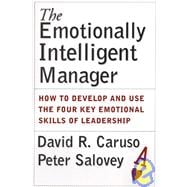We have long been taught that emotions should be felt and expressed in carefully controlled ways, and then only in certain environments and at certain times. This is especially true when at work, particularly when managing others. It is considered terribly unprofessional to express emotion while on the job, and many of us believe that our biggest mistakes and regrets are due to our reactions at those times when our emotions get the better of us. David R. Caruso and Peter Salovey believe that this view of emotion is not correct. The emotion centers of the brain, they argue, are not relegated to a secondary place in our thinking and reasoning, but instead are an integral part of what it means to think, reason, and to be intelligent. In The Emotionally Intelligent Manager, they show that emotion is not just important, but absolutely necessary for us to make good decisions, take action to solve problems, cope with change, and succeed. The authors detail a practical four-part hierarchy of emotional skills: identifying emotions, using emotions to facilitate thinking, understanding emotions, and managing emotions-and show how we can measure, learn, and develop each skill and employ them in an integrated way to solve our most difficult work-related problems.
David R. Caruso is a research affiliate in the Department of Psychology at Yale University. He is also a management psychologist. His practice focuses on executive coaching, leadership development, and career assessment. Caruso conducts highly acclaimed training and development seminars on emotional intelligence, and he has published more than two dozen scientific articles and chapters. Prior to starting his own firm, he held a number of staff and line positions in consulting, small business, and Fortune 500 organizations in the areas of strategic planning, market research, and product management.
The Chris Argyris Professor of Psychology at Yale University, Peter Salovey published the first scientific articles on emotional intelligence (with John D. Mayer), introducing the concept to the field of psychology. Salovey also serves as dean of Yale's Graduate School of Arts and Sciences and has additional faculty appointments in the School of Management and the Department of Epidemiology and Public Health. He is currently president of the Society for General Psychology. A leading authority on the psychological consequences of mood and emotion as well as on health communication, he is widely quoted in print and broadcast media. Salovey was founding editor of the Review of General Psychology and served as an associate editor of the APA journals Emotion and Psychological Bulletin.


